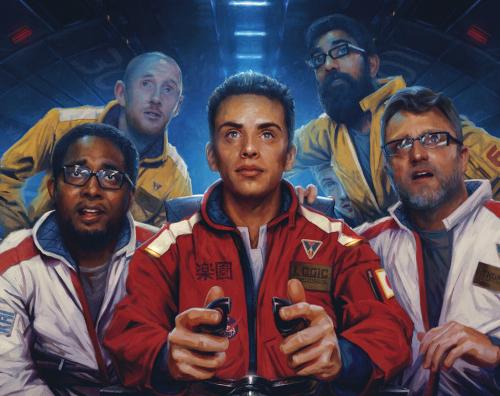Four years ago, he used to go by the name of “Young Sinatra” and dominated the underground music industry with his thrilling mix tapes. Now, at the age of 25, hip-hop and lyricist guru, Logic, continues to storm the game of hip-hop.
Deciding to deliver something new to the hip-hop industry, Logic added a futuristic, sci-fi theme in his sophomore album, “The Incredible True Story.”
The 17-track album debuted on Nov. 15 under Def Jam Recordings and Visionary Music Group. Inspired by Childish Gambino’s “Because of the Internet,” Logic plans to release a screenplay at a later time.
Opening the album with “Contact,” Logic paints the picture and setting of two travelers inside a spaceship searching for a new paradise. The song features Thalia, an automated voice from Logic’s freshman album “Under Pressure.”
The next two tracks, “Fade Away” and “Upgrade,” serve as a stage on which Logic attempts to get two contrasting points over to his audience. On the first line of the record we hear Logic say, “all day, everyday, we was on that block until we made a way,” which refers to the Section 8 housing Logic grew up in. “Fade Away” also encourages his audience with his carpe diem approach to the track.
Then, he transitions from a persuasive tone to a reflective tone on “Upgrade,” where he describes how he has evolved as an artist and left behind the forces dragging him down. These first two tracks have a lot of references to Logic’s old work, so “Upgrade” can also show how he is going to take this album to new heights down the line.
Teaming up with producer 6ix, “Like Whoa” takes the listener to an easy-listening rap tune. The track combines a flute with a kick drum and features background vocals that almost make it sound heavenly.
Taking it back to the ‘90s on “Young Jesus” (pun intended), Logic delivers a near-beautiful flow on the old school beat. Prior to the album’s release, this track was Logic’s first single. Big Lenbo, a fellow member of Logic’s rap group RattPack, joins the track and adds a Bronson-DZA type of flow on the record.
Next, Logic starts to get deep and meaningful in the next coming tracks, more specifically with “Innermission.” The theme throughout the album is of a journey through space, but on this track, Logic takes a journey to his inner self. Lucy Rose hops in on the hook, and throughout the song, Logic makes it apparent to add very complex yet intriguing lyrics such as “Sometimes I fantasize about traveling space and time… I truly wish that I could see the sequel of our people.”
“I am the Greatest” and “Lord Willing” are the next two tracks that are complete polar opposites. Using the sample from Muhammad Ali’s “I am the Greatest” speech, this track lives up to its name, continuing to give reason to why Logic is the best rapper alive.
“Lord Willing” brings back 6six and introduces Sir Dylan on production. Mixed with Super Mario beats, this song humbles down Logic and encourages people and himself to “hold on” to all their ambitions.
The best song on the album is “City of Stars,” the 11th track on the album. He uses 808s’ production and auto-tuned vocals perfectly, showing obvious influences from Kanye West’s “Heartless,” “Coldest Winter” and “Flashing Lights.”
The first half of the track, Logic refers to living his life “without you,” or what could be referred to as living without his previous addiction to cigarettes, such as he said in “Nikki” in the previous album.
The second verse in this track is what catches the listener almost immediately. He examines closely the world of hip-hop and exploits all his faults. The half African-American, half Caucasian rapper tackles race on the second verse, saying he “loves hip-hop and hates hip-hop” due to all the negative response he hears going around. He encourages the listener to not simply criticize music so easily. However, he advocates for spreading equality and to end discrimination, whether it be toward race or jealousy.
Collaborating with Dria, Logic sampled Marvin Gaye’s “Distant Lover” on the 12th track “Stainless.” On this track, the two vocals between Logic and Dria merge for a near bubbly sound on the album.
On “Paradise,” Logic uses Outkast’s “Spottieottiedopaliscious” sample and refers to them in his first line, “Now this that SpottieOttieDopaliscious, hella vicious,” he raps. On this track, he travels back in time and explains the troubles Logic faced while growing up, and how he is still trying to reach paradise.
“Never Been” and “Run It” close off the album just before the outro. On “Never Been,” Logic pays homage to those who could never fulfill their dreams because of obstacles and convinces the listener to never give up, as he never did. “Run It” follows the same lines. With a dirty trap snare beat, the song talks about how he continues to work hard toward his goals, thus allowing him to run the rap game.
The last track on the album, “The Incredible True Story,” is an excellent sending forth track. The hook, “So they wonder who am I, so high,” plays on the “sober but so high” mentality, which Logic places in the album. Using a quote by Alan Watts to finish up the album, he inspires the listener to do what they want to do in life and abandon the things that will drag them down.
This motivational, politically correct album was an accomplished predecessor of his first album “Under Pressure.” Logic seems to only get better. Making it apparent to not flaunt riches, drugs and women, Logic reinvents his sound on this album and does not slow down once during “The Incredible True Story.”
Adrian Broaddus may be reached at [email protected].






